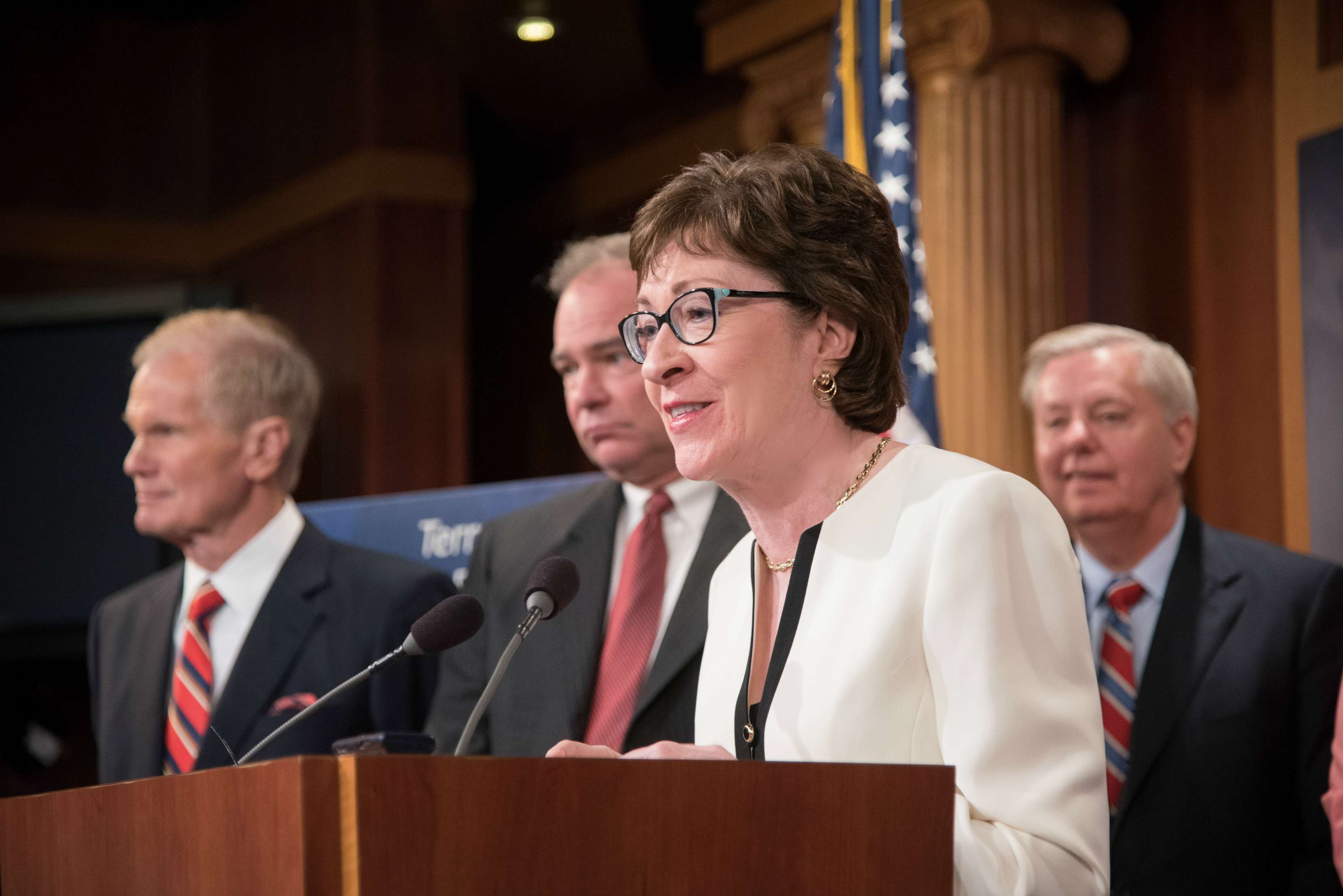'No Fly, No Buy' Proposal Takes Away Gun Rights First, Asks Questions Later (Maybe)
Susan Collins' Terrorist Firearms Prevention Act still flouts due process, but for fewer people.

Yesterday Sen. Susan Collins (R-Maine) supposedly unveiled her compromise bill aimed at stopping suspected terrorists from buying guns. I say "supposedly" because as I write the text of her Terrorist Firearms Prevention Act is not available on her website yet, and the summary she is offering adds little to what we knew before her press conference. In particular, it does not say what the government must do to permanently deprive someone of his Second Amendment rights, which is the central issue raised by legislation of this kind.
Instead of covering anyone the attorney general deems "a threat to public safety" based on a "reasonable suspicion" of involvement in terrorism, as an amendment introduced by Sen. Dianne Feinstein (D-Calif.) and rejected by the Senate on Monday did, Collins' bill focuses on two subsets of the FBI's Terrorism Screening Database (TSDB, a.k.a. the Terrorist Watchlist): the "no fly" list, which includes people barred from air travel within the United States, and the "selectee" list, which includes people who must undergo additional screening before flying. Collins' office says the two smaller lists cover about 109,000 people, including 2,700 or so Americans, compared to 1 million or so people in the TSDB. "Essentially," Collins said yesterday, "we believe that if you are too dangerous to fly on an airplane, you are too dangerous to buy a gun." There are a couple of obvious problems with that reasoning: People on the no-fly list are too dangerous to fly on an airplane according to the FBI, and people on the selectee list are not too dangerous to fly on an airplane even according to the FBI.
What happens when the FBI wrongly suspects someone of ties to terrorism? "Individuals on the narrower No Fly and Selectee lists would not be allowed to purchase guns," says Collins' summary of her bill, "but Americans and green card holders would have due process rights to appeal in the Court of Appeals following a proscribed procedure." I think she means "a prescribed procedure," which would be the procedure laid out in her bill, as opposed to "a proscribed procedure," which would be a procedure forbidden by her bill. In any case, she offers no details about what this mandated or prohibited procedure would entail.
Feinstein's bill also ostensibly gave people stripped of their constitutional right to keep and bear arms an opportunity to challenge that deprivation, but apparently only if they could show that it resulted from "erroneous system information," as opposed to unsubstantiated suspicions. A bill proposed by Sen. John Cornyn (R-Texas), also defeated on Monday, would have allowed the Justice Department to delay a gun purchase by "a known or suspected terrorist" for up to three days, during which time it would have to persuade a judge that there was probable cause to believe the would-be buyer was in fact involved in terrorism (the same standard that must be met for a criminal charge). Collins' summary is silent on the crucial question of what standard would apply when a suspected terrorist argues that government's suspicions are wrong.
Collins does say the attorney general "would have the burden of proof." But burdens can be heavy or light, and it makes a big difference whether the standard is proof beyond a reasonable doubt, clear and convincing evidence, a preponderance of the evidence, probable cause, reasonable suspicion, or something even weaker. An earlier version of Feinstein's bill, for instance, required the government to show by a preponderance of the evidence that the attorney general's suspicion was reasonable, which essentially means taking whatever probability qualifies as reasonable suspicion and cutting it in half.
There is also the issue of who has to bring the matter to court, because without a case the burden of proof is irrelevant. Unlike Cornyn's bill, which would have allowed a gun sale to go through after a three-day delay unless the government met its burden of proof, Collins' bill makes the deprivation of Second Amendment rights permanent unless the would-be buyer appeals and prevails. Feinstein's bill took the same approach.
Even Cornyn's proposal (which has the NRA's support) is problematic, since it allows a prior restraint on someone's constitutional rights (for up to three days) before any evidence at all has been produced. Once the three-day period ends, the restraint continues based on probable cause, which is similar to the federal law that bans gun purchases by people facing felony charges. But with other felonies, that deprivation continues only if the suspect is convicted. Under Cornyn's bill, it sounds like a one-time probable cause showing is enough to indefinitely take away someone's Second Amendment rights.
The American Civil Liberties Union opposed Cornyn's bill as well as Feinstein's, since both relied on a secretive and mistake-riddled system for identifying suspected terrorists. "Our nation's watchlisting system is error-prone and unreliable because it uses vague and overbroad criteria and secret evidence to place individuals on blacklists without a meaningful process to correct government error and clear their names," the ACLU said. "The government contends that it can place Americans on the No Fly List who have never been charged let alone convicted of a crime, on the basis of prediction that they nevertheless pose a threat (which is undefined) of conduct that the government concedes 'may or may not occur.' Criteria like these guarantee a high risk of error, and it is imperative that the watchlisting system include due process safeguards—which it does not."


Show Comments (88)